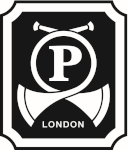The Paxman Model 45,
began with Richard Merewether’s association with Paxman in the 1940s, when he approached the company with his ideas for a descant horn in f-alto. This eventually culminated in the Paxman Bb/f-alto double descant which quickly became and remains the benchmark for this kind of horn.
The current model features the original Paxman designed valve, which diverts the airway from a point close to the mouthpiece where the tube diameter is small. This allows both the Bb and f-alto horns to have the correct and individual tapers for both mouthpipe and branch. The two sides then converge in the same valve when the bore of both horns has expanded to match the final approach to the bell throat. The most recent horns feature a longer taper on the f-alto mouthpipe. This both enhances the tone and improves the intonation, especially at the lower end of the descant horn range, making the overlap between the Bb and f-alto horns greater and enabling a more flexible transition between the two sides.
OPTIONS
Bore: M-Medium ML-Medium/Large L-Large
Metal: Y-Yellow brass G-Gold brass N-Nickel silver
Bell Flare: F-Fixed D-Detachable
Lever Action: C-Cord M-Minibal
Valve Section: S-Standard C-Compact
Pitch: A-442 unless otherwise specified
The model 45 also uses the Paxman dual bore system, so the cylindrical tubing of the f-alto horn is fractionally narrower, evening the resistance between the two sides and further enhancing the sound quality. The stopping valve on the Bb side also enables the use of an F extension, adding the open harmonics of the low F horn and making the model 45 a very versatile instrument.
The model 45 has the Paxman compact valve section fitted as standard, making it both lighter and more precise in action.
The Paxman Model 45 Heritage
by popular request was built to hark back to an older, original Paxman design and at the same time incorporate the latest modern innovations. The result is the model45 Heritage descant horn. Built in Yellow brass with a Medium, detachable bell, this instrument is based on the older style Paxman descant horns designed and built in the 1960s-1980s but has many features not possible, or not yet imagined, when this style of horn was previously built.
Tim Jones
on the Paxman Model 45
This extract from the first movement of Leopold Mozart's Concerto in D is played by Michael Thompson on a Paxman Descant horn and is taken from the Classical Horn Concertos Nimbus CD with the Philharmonia Orchestra, directed by Christopher Warren-Green (previously released as The Golden Echo). Michael currently plays a Paxman Model 40.



